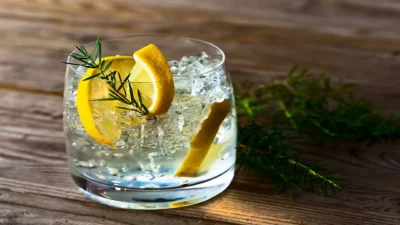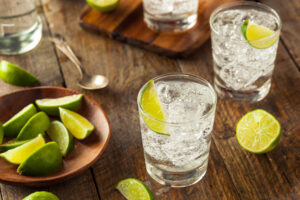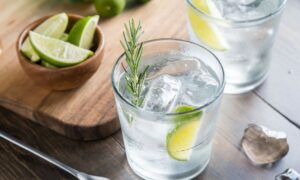Among the various spirits available, gin and vodka stand out as popular choices, each with its unique characteristics and flavor profiles. As health-conscious consumers seek to make informed decisions about their libations, the question arises: Is gin healthier than vodka?
In this article, we delve into the distinct attributes of gin and vodka, examining their ingredients, production processes, and potential health benefits.
While moderation is key when it comes to alcohol consumption, understanding the nuances between these two spirits may offer valuable insights for those looking to strike a balance between indulgence and well-being.
Is gin healthier than vodka?
When it comes to comparing the health aspects of gin and vodka, it’s important to note that both are distilled spirits and share some similarities. Here are some general points to consider:
- Calories: In terms of calories, both gin and vodka are relatively low-calorie options when consumed in moderation. They typically contain about 97-110 calories per 1.5 ounces (44 ml).
- Carbohydrates: Vodka generally contains fewer impurities and is often considered lower in carbohydrates than gin. However, the difference is usually minimal.
- Flavorings: Gin is flavored with botanicals, including juniper berries and various herbs and spices. This gives gin a more distinctive flavor compared to vodka, which is a neutral spirit. If you’re sensitive to certain botanicals or have allergies, this may influence your choice.
- Congeners: Congeners are byproducts of the fermentation and distillation process that contribute to the taste and aroma of a spirit. Some people believe that darker spirits, which contain more congeners, can lead to worse hangovers. Vodka, being a clear spirit, generally has fewer congeners than darker spirits like whiskey or rum.
- Personal Tolerance: People may react differently to different types of alcohol. Some individuals may find that they tolerate one type of spirit better than another.
- Mixers: The healthiness of a drink can also depend on what it’s mixed with. If you’re concerned about the overall health impact, choosing low-calorie mixers and avoiding excessive sugar can be beneficial.
Remember that moderation is key when it comes to alcohol consumption. Excessive alcohol intake can have negative health effects, including liver damage, increased risk of certain cancers, and addiction.
It’s always a good idea to consult with a healthcare professional if you have specific health concerns or questions about alcohol consumption.
What are the nutritional differences?
Gin and vodka are both distilled spirits, and their nutritional profiles are quite similar. Here is a general comparison of the nutritional content of gin and vodka:
Gin (per 1.5-ounce or 44-milliliter serving):
- Calories: Approximately 97-110 calories
- Carbohydrates: Generally minimal, as gin is a distilled spirit. The flavorings come from botanicals, which don’t significantly contribute to the carbohydrate content.
- Sugar: Typically very low to zero sugar content
- Fat: Negligible
- Protein: Negligible
Vodka (per 1.5-ounce or 44-milliliter serving):
- Calories: Approximately 97-110 calories
- Carbohydrates: Very low, as vodka is a distilled spirit with minimal impurities.
- Sugar: Typically very low to zero sugar content
- Fat: Negligible
- Protein: Negligible
It’s important to note that while these spirits are low in calories and generally free of carbohydrates, the mixers used in cocktails can significantly impact the overall nutritional content of a drink. For example, sugary mixers can add calories and carbohydrates.
Additionally, excessive alcohol consumption can have various health risks, regardless of the specific type of alcohol consumed. It’s always advisable to drink in moderation and be mindful of your overall dietary choices. If you have specific health concerns or dietary restrictions, it’s a good idea to consult with a healthcare professional or a registered dietitian.
Does gin have fewer calories?
The calorie content of gin and vodka is generally quite similar, as both are distilled spirits and contain a comparable amount of alcohol. On average, a 1.5-ounce (44-milliliter) serving of gin or vodka typically contains about 97-110 calories.
The calorie content in these spirits primarily comes from the alcohol itself, which provides about 7 calories per gram. Both gin and vodka are low in carbohydrates and fat, with negligible amounts of protein.
While there might be slight variations between different brands or specific products, the overall calorie difference between gin and vodka is minimal. When choosing between the two based on calorie content, other factors such as personal preference, flavor, and potential mixers used in cocktails may be more significant considerations.
Additionally, keep in mind that the overall health impact of alcoholic beverages extends beyond just calorie content, and moderation is key to responsible alcohol consumption.
Potential health benefits of gin over vodka
When comparing gin and vodka in terms of potential health benefits, it’s important to note that both are alcoholic beverages, and excessive alcohol consumption can have negative health effects.
However, some people believe that certain components in gin may offer some potential health benefits when consumed in moderation. Here are a few factors to consider:
- Botanicals in Gin: Gin is flavored with botanicals, such as juniper berries, coriander, and citrus peel. Some of these botanicals may have antioxidant properties. Antioxidants help neutralize free radicals in the body, which can contribute to overall health. Juniper berries, in particular, are known for their potential health benefits.
- Juniper Berries: These berries are a key ingredient in gin and are believed by some to have medicinal properties. They have been historically used for their diuretic and anti-inflammatory effects. However, the concentration of juniper in gin is relatively low, so the health benefits may be limited.
- Lower Caloric Content: Gin generally has a lower caloric content than vodka because it is distilled with botanicals, which can contribute flavor without adding significant calories.
- Blood Circulation: Some botanicals used in gin, such as juniper and coriander, have been traditionally associated with potential benefits for circulation. However, more research is needed to fully understand these effects.
It’s crucial to emphasize that these potential health benefits are associated with moderate alcohol consumption. Excessive alcohol intake can have serious health consequences, including liver damage, increased risk of certain cancers, cardiovascular problems, and addiction.
Always remember that individual responses to alcohol can vary, and what may be considered moderate for one person may not be the same for another. If you have any health concerns or conditions, it’s advisable to consult with a healthcare professional before making decisions about alcohol consumption.
Additionally, some individuals should avoid alcohol altogether, such as pregnant women, individuals taking certain medications, and those with certain health conditions.
Impact on hangovers or adverse effects
Both gin and vodka are distilled spirits, and while individual responses to alcohol can vary, the likelihood of experiencing hangovers or adverse effects is generally influenced by factors such as the amount consumed, individual tolerance, hydration, and the presence of congeners.
- Congeners: Congeners are impurities produced during the fermentation and distillation process. Darker spirits like whiskey and red wine tend to have higher congeners, which are associated with more severe hangovers. Gin and vodka, being clear spirits, generally have lower congener levels. Some people find that they experience milder hangovers when consuming clear spirits compared to darker ones.
- Hydration: Alcohol is a diuretic, meaning it increases urine production and can contribute to dehydration. Dehydration is a common factor in the development of hangover symptoms. To minimize the impact of hangovers, it’s important to stay hydrated by drinking water alongside alcoholic beverages.
- Alcohol Content: The alcohol content of a beverage also plays a role. Both gin and vodka can vary in alcohol content, but they are often similar. It’s crucial to be mindful of the alcohol by volume (ABV) percentage and to moderate your overall alcohol intake.
- Mixers and Additives: The choice of mixers and additives can influence the likelihood and severity of hangovers. Sugary mixers, for example, may contribute to dehydration and exacerbate hangover symptoms. Choosing mixers that are lower in sugar and staying hydrated can help mitigate the impact.
- Individual Tolerance: People vary in their tolerance to alcohol. Factors such as age, weight, overall health, and genetics can influence how an individual metabolizes alcohol. Some individuals may be more prone to hangovers or adverse effects than others.
It’s important to note that excessive alcohol consumption can have serious health consequences beyond just hangovers. Chronic alcohol abuse can lead to liver disease, cardiovascular problems, and other health issues.
If you find that you consistently experience adverse effects from alcohol or have concerns about your alcohol consumption, it’s advisable to seek guidance from a healthcare professional.
Always drink responsibly, be aware of your limits, and consider the potential impact of alcohol on your health and well-being. If you are experiencing persistent hangovers or negative effects, it may be a sign that you should reassess your alcohol consumption habits.
Conclusion
We have a comprehensive information for you on the debate: is gin healthier than vodka. The comparison between gin and vodka in terms of healthiness is nuanced and depends on various factors.
Both spirits are low in calories and typically contain no carbohydrates or sugar. However, the choice between gin and vodka may be influenced by individual preferences, as well as the specific ingredients and production methods used in each.
Moderation is key when consuming alcoholic beverages, and individuals should consider their own health, preferences, and any potential sensitivities when choosing between gin and vodka or any other alcoholic drinks.
It’s advisable to consult with a healthcare professional for personalized advice on alcohol consumption and its potential impact on health.




